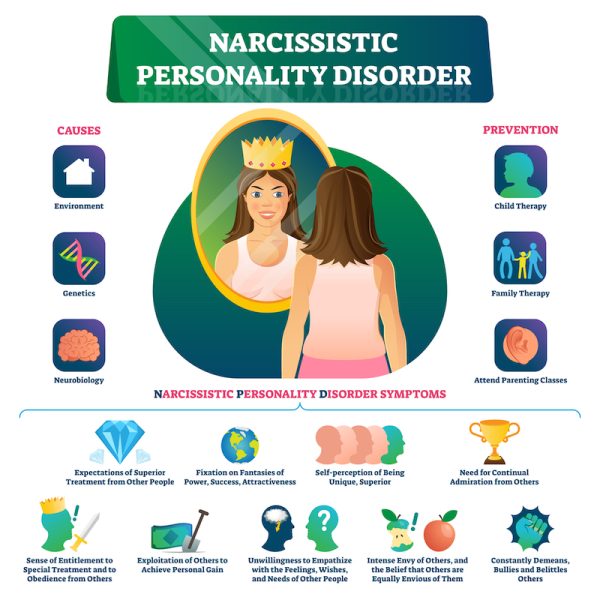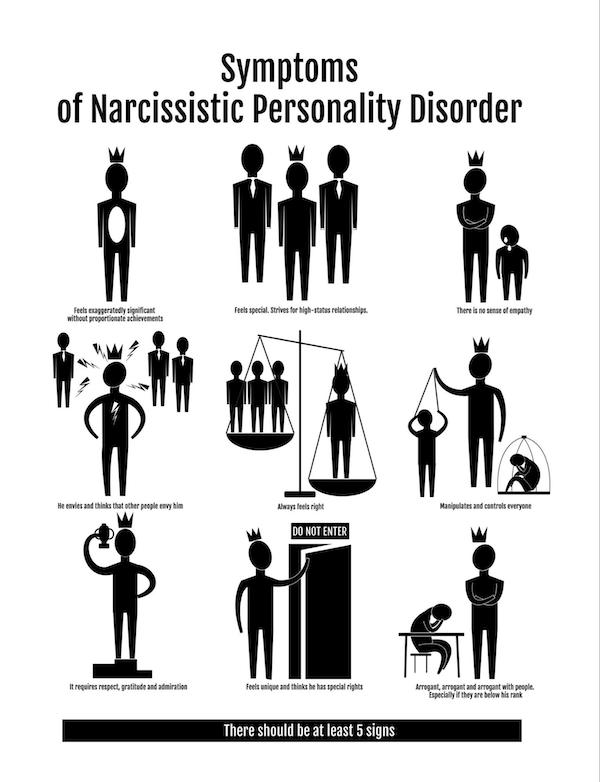Branded Content by Cosmic Press
Narcissism is a term that has become increasingly common in conversations about personality traits and relationships. At its core, narcissism is a fascination with oneself, often accompanied by a heightened sense of self-worth and entitlement. It can manifest in the form of excessive admiration for personal appearance, accomplishments, and abilities. However, it’s important to differentiate between healthy self-esteem and the more extreme traits exhibited by individuals with narcissistic personality disorder (NPD).
Narcissistic personality disorder is a complex mental health condition marked by an inflated sense of self-importance, a deep need for admiration, and a lack of empathy for others. The characteristics of narcissism can be pervasive, causing significant distress and dysfunction in a person’s relationships, workplace, and daily life. Different types of narcissism exist, ranging from the overtly grandiose to the subtly self-absorbed. Understanding these nuances helps to better identify and address the challenges that arise in personal and professional interactions with narcissistic individuals.
Key Takeaways
- Narcissism encompasses an obsession with oneself, while NPD exhibits more extreme and harmful characteristics.
- NPD affects a person’s relationships and functioning in various settings, often causing distress and dysfunction.
- There are different types of narcissism, understanding which is crucial for effective management and coping strategies.
Understanding Narcissistic Personality Disorder

Narcissistic Personality Disorder (NPD) is a mental health condition categorized under the umbrella of personality disorders. It is characterized by an inflated sense of self-importance, a deep need for excessive attention, and a lack of empathy for others. This disorder is primarily identified and diagnosed using the DSM-5, the Diagnostic and Statistical Manual of Mental Disorders, 5th Edition.
As someone interested in understanding NPD, it is essential to recognize its key traits and behaviors. Some common symptoms include:
- Exaggeration: Individuals with NPD often exaggerate their achievements and talents, appearing boastful and pretentious.
- Sense of entitlement: They generally have a strong belief that they deserve special treatment from others and may become angry or resentful when this does not happen.
- Manipulation: In interpersonal relationships, individuals with NPD may manipulate others to meet their own needs and desires.
- Lack of empathy: They often have difficulties understanding the feelings and needs of others, making them appear cold and uncaring.
NPD is one of several personality disorders, a group of mental health conditions that involve long-standing, inflexible, and maladaptive patterns of thoughts and behaviors. These disorders can lead to significant distress and impair social, occupational, and emotional functioning.
It is crucial to differentiate NPD from other personality disorders and mental health conditions. While NPD shares some features with other disorders, such as the need for admiration and grandiosity, it is unique in the pervasive absence of empathy and the unrelenting focus on the self.
If you or someone you know exhibits traits of narcissistic personality disorder, it is advisable to seek professional help. A mental health professional, such as a psychologist or psychiatrist, can evaluate the symptoms and develop a treatment plan to address the specific needs of the individual.
Please note that understanding NPD is a stepping stone toward empathy and support for those affected by this mental health condition. By educating yourself, you are taking a crucial step in promoting mental health awareness and destigmatizing personality disorders.
Characteristics and Traits of a Narcissist
Narcissists display certain tendencies and behaviors that may have detrimental effects on your relationships with them. The following paragraphs outline some of the key characteristics you should be aware of when dealing with a narcissist.
One key characteristic of a narcissist is their heightened sense of self-importance. They may continuously seek validation and admiration from others and can be excessively preoccupied with their appearance or achievements. In fact, they can even play the victim to gain attention and sympathy, using these manipulative tactics to maintain their importance.
Another common trait is their grandiosity, which refers to an exaggerated belief in their abilities or accomplishments. This can manifest in their behavior and even lead to overt narcissism, which is a particularly noticeable type of narcissistic personality disorder. They may express a need to be the center of attention and believe they are inherently better than others. This can make them difficult to handle in social situations and may lead to conflicts.
Narcissists also exhibit a lack of empathy for others. This means they have a limited ability to recognize and understand the feelings and experiences of those around them. Therefore, it becomes increasingly difficult for them to create genuine emotional connections with other people. Antagonistic narcissists are experts at using this lack of empathy to exploit and manipulate others for their own gain.
Furthermore, narcissists have a strong sense of entitlement, which means they believe they deserve special treatment and privileges. This can make them demanding and overbearing in various aspects of their lives. They may frequently exhibit grandiose narcissism as they expect others to cater to their needs and desires without considering the impact on those around them.
Overall, understanding these characteristics of narcissists can be helpful in knowing how to better deal with them. By being aware of their traits, you can recognize potential issues early on and take steps to protect yourself from their detrimental behavior.
Narcissism and Relationships

Narcissism can significantly impact your relationships with others. It affects the person’s ability to feel empathy and genuinely connect with those around them. This lack of connection may lead to exploitation and emotional abuse in a relationship with a narcissist.
A narcissist’s main focus is on their own needs and desires, often disregarding the feelings of their partner. This can lead to a violation of boundaries in personal relationships, as the person with narcissistic traits may not respect the other person’s limits and needs.
When in a relationship with a narcissist, it’s important to be aware of the potential for manipulation and narcissistic abuse. This might include belittling, gaslighting, or other controlling behaviors that undermine the other person’s self-esteem and autonomy. It is crucial to establish healthy boundaries and seek support from friends, family, or a therapist to help navigate these complex dynamics.
In some cases, a narcissist may discard their partner once they no longer serve their needs or when they find someone else who offers more to their inflated ego. This often leaves the discarded person feeling confused, hurt, and struggling to rebuild their life. It is essential to seek support from loved ones or a mental health professional to work through the emotions and rebuild self-confidence during this challenging time.
In summary, being in a relationship with a narcissist can be emotionally taxing and have long-lasting effects on your well-being. It is important to recognize the warning signs, establish boundaries, and seek support when navigating a relationship with someone displaying narcissistic traits.
Narcissistic Behavior in Various Settings
In your professional life, you might encounter narcissistic behavior at work. Narcissists often seek jobs that provide them with constant praise, recognition, and status. They might exhibit a strong desire to control and manipulate colleagues and crave validation for their accomplishments. It’s essential to pay attention to signs of narcissist cheating patterns, such as undermining others’ achievements or taking credit for other people’s work. You can recognize and understand these patterns by reading about Narcissist Cheating Patterns: Decoding Infidelity Signs.
School settings might also reveal some narcissistic tendencies. Narcissists may prioritize status in selecting their educational institution, often choosing prestigious schools that enhance their image. While attending classes, they typically expect special treatment and constant admiration from both peers and teachers. Their relentless pursuit of accolades might leave them struggling to build genuine relationships with classmates.
Narcissists may also crave praise and recognition in social contexts. They often engage in self-promotion, showcasing their abilities, assets, or social connections. Conversations can become one-sided as they tend to dominate discussions, displaying an exaggerated sense of importance. They might also show little interest in others’ experiences or opinions, leading to shallow communication and potential conflict.
In relationships, narcissists may use various manipulation tactics to maintain power and control over their partners. They might gaslight or provide false praise to maintain an illusion of superiority. Understanding their infidelity signs might help protect yourself from emotional harm if involved in such a relationship.
In conclusion, narcissistic behaviors manifest in various settings, including work, school, relationships, and social environments. To protect yourself and avoid falling victim to their manipulative tactics, it’s crucial to recognize and understand the signs of narcissism.
Types of Narcissism

When exploring narcissism, it is vital to understand the different types of narcissists that exist. In this section, we will briefly discuss two primary types: grandiose narcissism and vulnerable narcissism.
Grandiose narcissism is the most well-known form of narcissism. Individuals with this type of narcissism exhibit an inflated sense of self-importance, vanity, and excessive self-confidence. They often seek admiration from others and believe that they are entitled to special treatment. Grandiose narcissists are typically extroverted and may appear charming, charismatic, and confident. They can be manipulative and tend to exhibit a lack of empathy for others.
On the other hand, vulnerable narcissism is characterized by a more covert and fragile sense of self-importance. These individuals may be highly sensitive to criticism and have intense feelings of shame or inadequacy. Unlike grandiose narcissists, vulnerable narcissists are more introverted and struggle with maintaining relationships due to their emotional volatility. They still crave validation and admiration, but they’re more likely to use self-pity and guilt-tripping tactics to manipulate others.
It is crucial to recognize these distinct forms of narcissism because they manifest in different ways and require different approaches when addressing their behavior or seeking treatment for those who are affected. Understanding the different types of narcissists can help you identify and respond to narcissistic behavior in yourself or those around you.
The Psychology Behind Narcissism
Narcissism is often linked to a cocktail of psychological factors, such as self-esteem, insecurity, shame, fantasies, fear, and envy. Understanding these factors can provide insight into the mind of a narcissist and offer strategies for clear communication.
Insecure attachment and low self-esteem often fuel narcissistic tendencies. For instance, individuals with low self-esteem may develop a grandiose sense of self to mask their insecurities. They may engage in fantasies of power, success, or attractiveness to compensate for the shame and fear of not being good enough.
Narcissists may also harbor a deep-rooted sense of envy, which contributes to their desire for constant admiration and attention. This quest for external validation can manifest in different ways, such as seeking praise for their achievements or excessively comparing themselves to others.
To better communicate with a narcissist, it’s essential to establish clear boundaries and avoid playing into their manipulative tactics. One helpful resource, How to Respond to a Narcissist Text: Effective Strategies for Clear Communication, offers valuable tips on confidently handling text conversations with narcissists while maintaining your own emotional well-being.
In summary, unraveling the psychology behind narcissism reveals a complex interplay of factors ranging from self-esteem and insecurity to shame and envy. By understanding these elements, you’ll be better equipped to navigate interactions with narcissistic individuals and maintain healthy relationships.
Causes and Contributing Factors
Narcissism is a complex trait with diverse contributing factors. To better understand this personality disorder, let’s examine the causes and factors that may contribute to its development.
Genetics: Research suggests that narcissistic traits can have a genetic component. Studies involving twins have shown that narcissist tendencies are more likely to be present in both twins when compared to unrelated individuals. This means that if you have a close blood relative with narcissistic traits, you may have a higher chance of developing similar traits.
Environment: Your upbringing and environment can also influence the development of narcissistic traits. Exposure to certain experiences or environments, such as growing up in a household with high expectations and constant praise, can contribute to the formation of a narcissistic personality. It is important to recognize how your environment has played a role in shaping your attitudes and behaviors.
Parenting: Parenting styles and strategies can have a significant impact on the development of narcissism. If you were raised by parents who regularly provided excessive admiration, you may be more prone to developing narcissistic traits. Conversely, if you experienced neglect or criticism from your parents, this could also lead to the formation of narcissistic tendencies, as you may seek validation and success to compensate for the lack of support in your childhood.
In conclusion, the development of narcissism is influenced by a combination of genetic and environmental factors, including parenting styles and the environment in which you were raised. Understanding these contributing factors can help you gain insight into the root cause of narcissistic traits and guide you in seeking appropriate support and guidance to manage them.
Treatment and Coping Strategies
Pursuing treatment can be crucial in overcoming the negative impacts of narcissistic abuse on your life. One effective method is psychotherapy, which can help you learn to rebuild your sense of self and change harmful thought patterns.
Therapists often employ techniques such as cognitive-behavioral therapy (CBT) and dialectical behavior therapy (DBT) to work with you on developing skills that foster emotional regulation, stress reduction, and interpersonal effectiveness. Building these skills allows you to cope more effectively with the aftermath of narcissistic abuse and foster healthier relationships in the future.
In addition to therapy, you might find it helpful to seek support from others who have experienced narcissistic abuse. Engaging in support groups, both in-person and online, can be beneficial for gaining insight, validation, and camaraderie from individuals who understand your struggles. This shared sense of community can help you recognize the Signs You’re Healing from Narcissistic Abuse: How to Move Forward.
As you undergo change, remember that recovery is a process that takes time and patience. Be kind to yourself, and avoid pressuring yourself to heal at a rapid pace. Remember that you are rebuilding yourself after enduring a challenging and traumatic experience. By seeking professional guidance and implementing effective coping strategies, you can pave the way for your journey of healing and self-discovery.
Frequently Asked Questions
How can one identify narcissistic behavior?
Identifying narcissistic behavior involves looking for patterns that are indicative of this personality trait. You may notice one consistently displaying excessive self-importance, having a sense of entitlement, or exploiting others for personal gain. They may also have a lack of empathy and constantly seek admiration from others.
What are the common traits of a narcissist?
Common traits of a narcissist include:
- Exaggerated sense of self-importance
- Belief in being unique or superior to others
- Need for constant admiration and validation
- Sense of entitlement
- Exploitative behavior
- Lack of empathy
- Enviousness
- Arrogance
Keep in mind that not every individual displaying these traits is a narcissist, but a combination of these traits could indicate narcissistic personality disorder.
How can someone cope with a narcissistic relationship?
Coping with a narcissistic relationship requires self-awareness, clear boundaries, and emotional support. Focus on your own emotional needs, establish healthy boundaries, and seek professional guidance if necessary. Surround yourself with supportive friends and family members who can offer emotional validation and advice.
What are the symptoms of narcissism?
Narcissism symptoms include an excessive need for admiration, sense of entitlement, exploitation of others, lack of empathy, envy, and a preoccupation with self-image and success. These symptoms are often accompanied by arrogance, manipulative behavior, and the inability to recognize or care about the needs and feelings of others.
Can a narcissist truly love another person?
Narcissistic individuals have difficulty experiencing genuine love, as their primary focus tends to be on their own needs and self-image. This doesn’t mean they are incapable of forming attachments, but love is usually conditional because of their inability to empathize and prioritize the needs of others.
What are the red flags indicating narcissism?
Red flags of narcissism include excessive self-centeredness, frequent manipulation, arrogance, exploiting others, unwillingness to take responsibility, and a consistent lack of empathy. Additionally, they may become easily envious and display excessive need for admiration from others.
Branded content furnished by our promotional partners. The Daily Sundial editorial staff is not involved in its production. Content does not reflect the views or opinions of the editorial staff.







